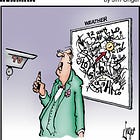Mini Case Study: Case of the Crying Salesman
A Beleagured Manager Doesn't Know What to Do. How Could They?
THE AIM for this entry is a quick analysis of a post I came across on the r/managers subreddit, which is a terrifying collection of “best practices” from the prevailing style of management. The scenario described above involves a manager and sales employee who broke down in tears at a recent performance review over failing to close any deals over a four month period. Despite a five-year tenure with many prior successes, the employee believed they were up for termination.
The business is now in a period of slower than expected sales, with top-performers only closing 1-2 deals per month. The manager has tried to help the employee directly, including moving them to different product lines and promotions, but nothing seems to work. As a last-ditch effort, they going to send the sales rep for retraining.
The manager is stumped: he doesn’t know what’s wrong, and suspects there could be personal issues affecting their performance.
What would Dr. Deming advise here? What follows is my own analysis and Rx — see if you agree.
What the Manager is Doing Right
First and foremost, they are trying to help their employee rather than just hanging them out to dry. However, because they don’t yet understand how the design of a system influences employee behaviours, the “helping” is more akin to “fixing”, which treats them as a cause rather than a symptom.
What the Manager is Getting Wrong
Much. Because they have no cogent theory of management, they can’t understand why an established employee is underperforming their peers despite all the “help” they’ve been provided, nor why they would be so upset in a performance review. Further, they do not appreciate their own role in creating and perpetuating the situation, despite their best efforts to correct it. Thus, they make a number of critical errors in judgement and action:
First, whether the manager acknowledges it or not, there is a culture of fear in the organization. Clearly, the employee knew they were underperforming and thought they would be terminated. Why would they think that? Where is that fear originating?
Second, because they do not understand or appreciate a systems view of leadership, they mis-attribute faults in the system to the individual. Recall what the Red Bead Experiment teaches us: that the majority of performance belongs to the system which includes how it is designed and managed. Further, they are unaware of the problems they’ve baked-in to their operations by predisposing reps to compete against each other.
Third, despite acknowledging that their business goes through hot and cold sales periods, and that they are currently in one that is sub-zero, they ironically fail to understand how systems vary in their performance over time, which includes the people working within them. This is made more evident by how they move the employee around expecting a different result, like swapping a part in and out of other areas to see if it still works.
Fourth, because they do not possess knowledge of systems and its attendant phenomena of variation, they make the mistake of relying on managing by numerical targets for sales per month. This distracts attention away from the method being used.
Rx: What Could the Manager Do Differently?
Put simply: learn about developing a systems view of leadership to replace their faulty theory of management that focuses on fixing parts with one that improves the interactions between them:
First, begin by attacking the sources of fear that have led to the employee becoming distraught by dissolving barriers to cooperation between the sales reps. This means eliminating commissions and bonuses and replacing them with a bump in baseline pay by the average annual awards, along with a profit sharing program geared to years of service. The aim of the game is to promote teamwork among sales reps so they actively help each other to win.
Second, become more curious about the people you lead: What motivates them about their work? What demotivates them? What are they happiest about? What are they missing? What do they like to do outside of work? Apply what you learn to design a better work system and to move people into roles that mesh with their intrinsic motivations.
Third, learn about systems and how they vary and apply this knowledge to designing sales processes geared to the business cycle. Work with upstream peers to develop features that will attract new customers while building fanatical loyalty with existing ones.
Fourth, provide channels for everyone to participate in improving the sales system. Good ideas can emerge from unexpected places.
Fifth, learn and lead by example. Take on the role of teacher to share what you are learning and how it can be applied.
What is the Deming Theory at Play?
In this analysis I’ve drawn from three sources of Dr. Deming’s theory to formulate a course of action in this case study: Point 8 of his 14 Points for Management, “Drive out fear”, the System of Profound Knowledge domains of Appreciation for a System, Knowledge of Variation, and Psychology, and the Faulty Practice of Setting Numerical Goals.
Ultimately, our manager is at his wits’ end because he doesn’t know what to do: his theory of management has nothing more to offer than blaming the employee for the faults of the system. As Dr. Deming would say, without being taught a different way with outside knowledge, how could they know?
Reflection Questions
Consider the Case of the Crying Salesman and his hapless manager from your own perspective. Have you or someone you know been on either side of a similar situation? How did you or your acquaintance/friend respond? What were the outcomes? Were there extenuating circumstances?
Consider the remedial activities I’ve suggested: were any of them undertaken in your circumstance? What were the outcomes? What would you have done differently?
From a Deming perspective, what other sources would you draw on from his theory to augment your remedial actions?
Let me know your thoughts in the comments below…










Let me take a stab at what this manager should do:
1) Run the equations to see if this output is a special problem or not. Considering the dearth of sales it's probably not a special problem so the eye must be turned towards the system which means the manager must take responsibility for themselves.
2) Assure the employee that its the manager's job to place them in front of sales. Sort of like the movie "Glenngary Glenn Ross" the good leads are a real thing.
3) Talk to clients, current former and prospective, to see what could be happening in the market. Maybe there's something is how they sell the product that is currently untenable for the client, for new business reasons, that they can change to make a win-win arrangement.